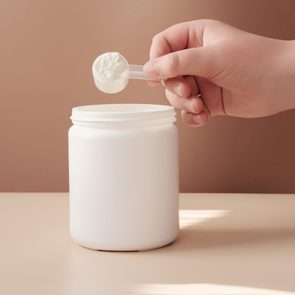Here’s the Difference Between Collagen Powder and Collagen Pills
Updated: Apr. 12, 2021
Collagen powders and collagen pills are both touted for their ability to boost skin health. So which should you choose? Here's what to know before buying.
What are collagen supplements?
Collagen supplements are flying from store shelves as growing numbers of people look for ways to turn back the hands of time.
Collagen is the main structural protein found in bones, muscles, skin, and tendons. Our bodies use the protein in our food to make collagen, but production slows as we get older. Supplements—whether collagen powders, collagen liquids, collagen pills (capsules), or collagen-enriched foods—promise to re-up your supply from the inside out.
When it comes to collagen powder vs. pills, which will give you the biggest bang for your buck? It comes down to personal preference, says Robin Foroutan, RDN, an integrative medicine dietitian at the Morrison Center in New York City and a spokesperson for the Academy of Nutrition and Dietetics.
Read on to learn how collagen powders and pills differ, and whether one form is better for you than the other.
Types of collagen supplements
There are 16 different types of collagen in the body, but the main four are types I, II, III, and IV, says Tod Cooperman, MD, president of ConsumerLab, an independent supplement-testing organization in White Plains, New York. Most collagen supplements on the market contain type I collagen. This is the type of collagen found in your skin, tendons, ligaments, and bones.
Collagen supplements also come in several forms, which relate to how they are absorbed by your body. Most collagen supplements on the market are hydrolyzed collagen, also known as collagen peptide or collagen hydrolysate. “The collagen has been broken down into basic amino acids that serve as building blocks of proteins,” Foroutan says. These amino acids are the raw materials that your body needs to build its own collagen stores back up. Because it’s so broken down, hydrolyzed collagen is easily absorbed into your bloodstream.
Other forms of collagen include gelatin, which is also broken down from large proteins but isn’t quite as broken down as hydrolyzed collagen. Undenatured collagen, by contrast, isn’t broken into amino acids. It comprises very small bits of type II collagen that stops the breakdown of your natural collagen stores.
Along with the type of collagen and its form, you’ll need to consider its source. Most collagen supplements come from animal sources, such as hides, bones, or fish scales. You can buy vegan collagen powder, but fewer of these products are available.
Potential benefits of collagen supplements
Science is limited when it comes to the benefits of collagen supplements. And the studies we do have are often small (making it hard to draw conclusions) and funded by companies that make collagen products (which may have swayed the research).
It’s safe to assume a lot of the claims collagen supplements make are just marketing claims. That said, a couple benefits have been more well-researched, and experts say they show promise. Those include collagen supplements’ effect on aging skin and joints.
Collagen for your complexion
There is a growing body of evidence that suggests collagen supplements—whether powder, capsule, or liquid—can help restore your skin’s youthful properties, says Ohara Aivaz, MD, a dermatologist at Cedars-Sinai in Los Angeles.
Sure signs that your collagen is in short supply are wrinkles and sagging skin. “It is collagen that keeps skin plump and wrinkle free, and as we get older, we lose collagen,” she says.
You’ll start to lose collagen in your 20s, and the process accelerates with exposure to pollution and the sun’s ultraviolet rays, along with some not-so-healthy habits like smoking, eating a high-sugar diet, and drinking alcohol excessively, Dr. Aivaz says.
(Check out these foods that naturally boost collagen to get younger-looking skin.)
In a 2019 review published in Journal of Drugs in Dermatology, researchers analyzed 11 studies that looked at how or if collagen supplements affected skin. They found that doses ranging from 2.5 to 10 grams per day increased skin elasticity and hydration.
“Why not do as much as you can to promote collagen?” Dr. Aivaz asks. Exactly how many collagen capsules you would need to replenish what is lost isn’t fully known, but she doesn’t advise taking more than 20 grams a day.
(Here’s what to know about collagen for hair.)
Collagen for your joint health
Collagen also plays a crucial role in protecting your joints. It lines and cushions the cartilage in your joints. As the amount of collagen in your body decreases, your risk of developing osteoarthritis, the wear-and-tear form of the disease, increases, causing pain and difficulty walking.
A small study in a 2017 issue of the British Journal of Sports Medicine found that people with osteoarthritis who took collagen supplements felt better, but there isn’t any evidence that suggests collagen supplements will grow or repair cartilage that lines the joints.
(Are collagen supplements a weight-loss aid?)

Collagen powder vs. pills: What’s the difference?
The difference between collagen powders and pills has less to do with the collagen and more to do with how you get it. Powder is loose and can be added to foods and drinks. Capsules, on the other hand, are typically filled with collagen powder and need to be swallowed like any other pill.
The best product for you largely depends on how you prefer to take your collagen. Do you like the convenience of swallowing a pill each day? Go with the capsules—and always follow the dosing instructions on the label.
Or would you rather eat your collagen with your meal? You can add powders and liquids—especially unflavored varieties—to smoothies, coffee, soups, and pretty much anything else. (Check out this Vital Proteins collagen creamer review.)
Or let your intended collagen dose decide the product for you: “Look at how many grams of collagen are in one scoop of powder and compare it to capsules,” Foroutan says. “Some people prefer capsules to powder, but you may have to take a whole lot of capsules for the equivalent dose.”
Swallowing a lot of capsules may be fine with you, but take caution if you have digestive issues. You may have difficulty breaking down the pills. Using powder instead will let you control the amount of collagen you take, plus what you take it with.
When collagen supplements may help
A collagen supplement may be worth a try for three months under a doctor’s supervision to see if it makes any meaningful difference in your joint health, says Mark Moyad, MD, the Jenkins/Pokempner director of preventive and alternative medicine at the University of Michigan Medical Center in Ann Arbor.
Many of the over-the-counter and prescription pain relievers have troublesome side effects when taken in large doses over an extended period of time, such as bleeding ulcers or liver damage.
“Collagen is relatively safe,” he says. “So it may be worth a try to see if you get a benefit.”
Minor side effects of collagen powders and pills may include stomach symptoms, headache, dizziness, or rash, Dr. Moyad notes.
Risks and concerns
Because they can be sourced from animal hides and carcasses, there is a chance collagen supplements can be contaminated with unsafe levels of toxic metals.
When the Organic Consumers Association conducted a study of 28 best-selling collagen peptide supplements on Amazon, they found that many contained measurable levels of potentially toxic heavy metals.
To lower your risk, choose a reputable brand with a third-party seal of approval, Dr. Moyad says. All brands should voluntarily share their certificate of analysis (COA), a document that lists precisely what is in the products, he says. Check a product’s COA before buying.
And keep in mind that you may not get what you pay for. Supplements aren’t regulated in the same way pharmaceuticals are, Dr. Aivaz says. That means there’s no way to know if the product you’re using actually contains collagen in the amounts listed on the label.
Here’s some good news: Consumer Lab’s testing showed that collagen products, including pills, did contain amounts of collagen as stated on their labels, ranging, per daily serving, from about 3 grams to 25 grams among powders and liquids.
The last word
The best collagen supplement for you comes down to personal preference. Collagen powders are easy to add to drinks and meals, and they’re a good option for higher intake levels. Collagen pills offer a quick way to take your collagen, sans mixing.
The best way to make sure you are getting what you pay for is to choose a reputable and transparent brand. Making lifestyle changes, such as applying a broad-spectrum sunscreen with an SPF of 15 or higher every day, eating a healthy diet rich in fruits and vegetables, not smoking, and drinking alcohol only in moderation, will help protect your natural collagen stores.























